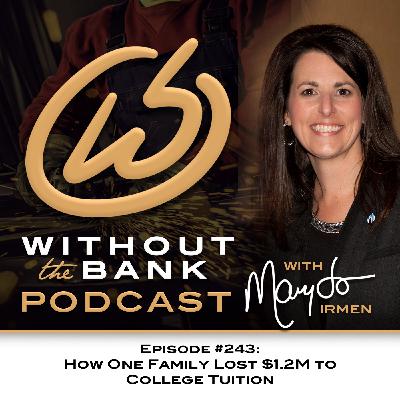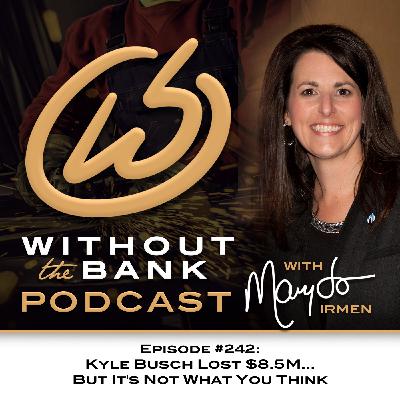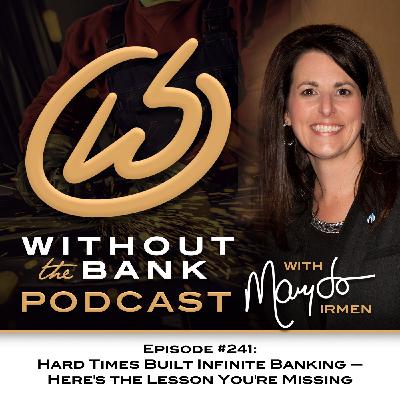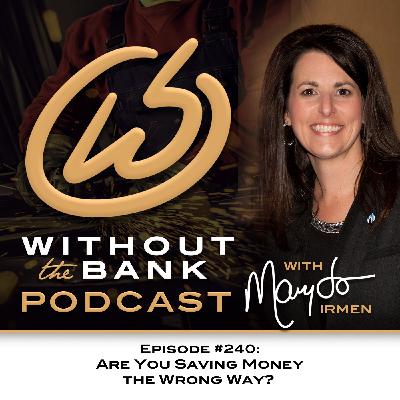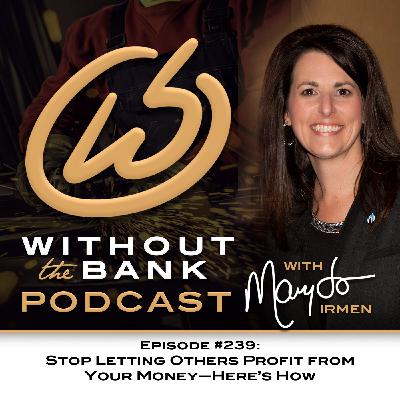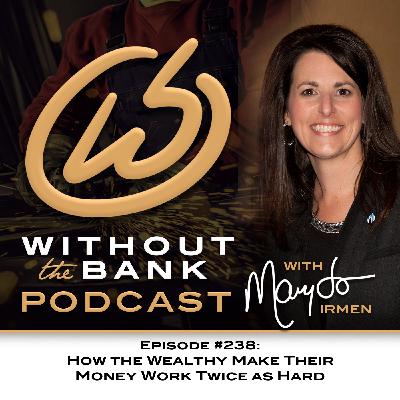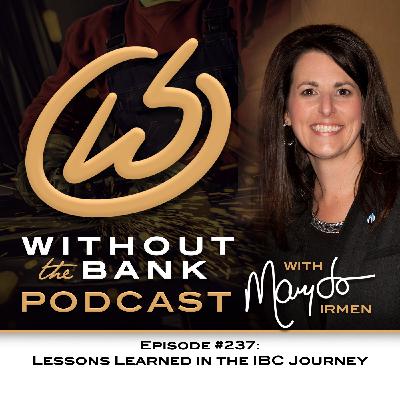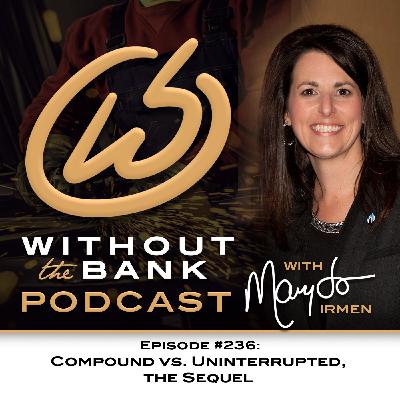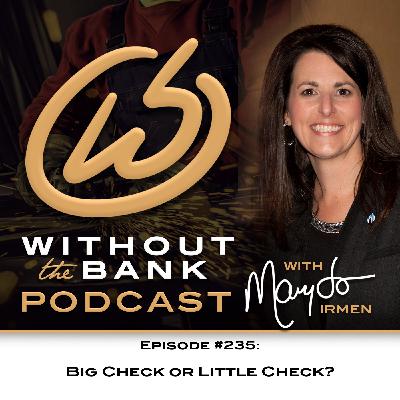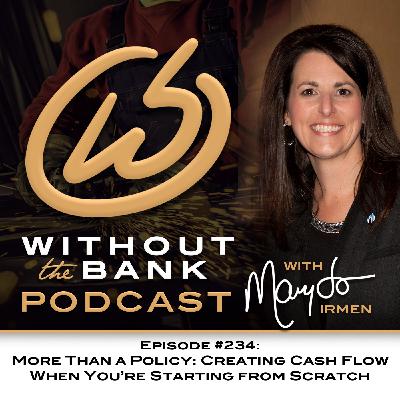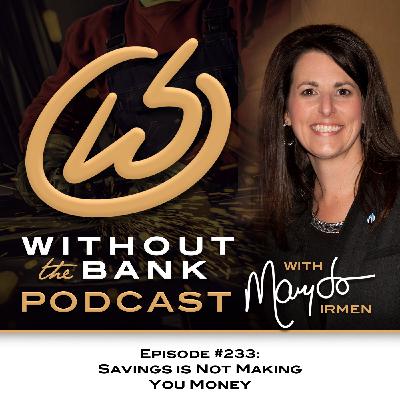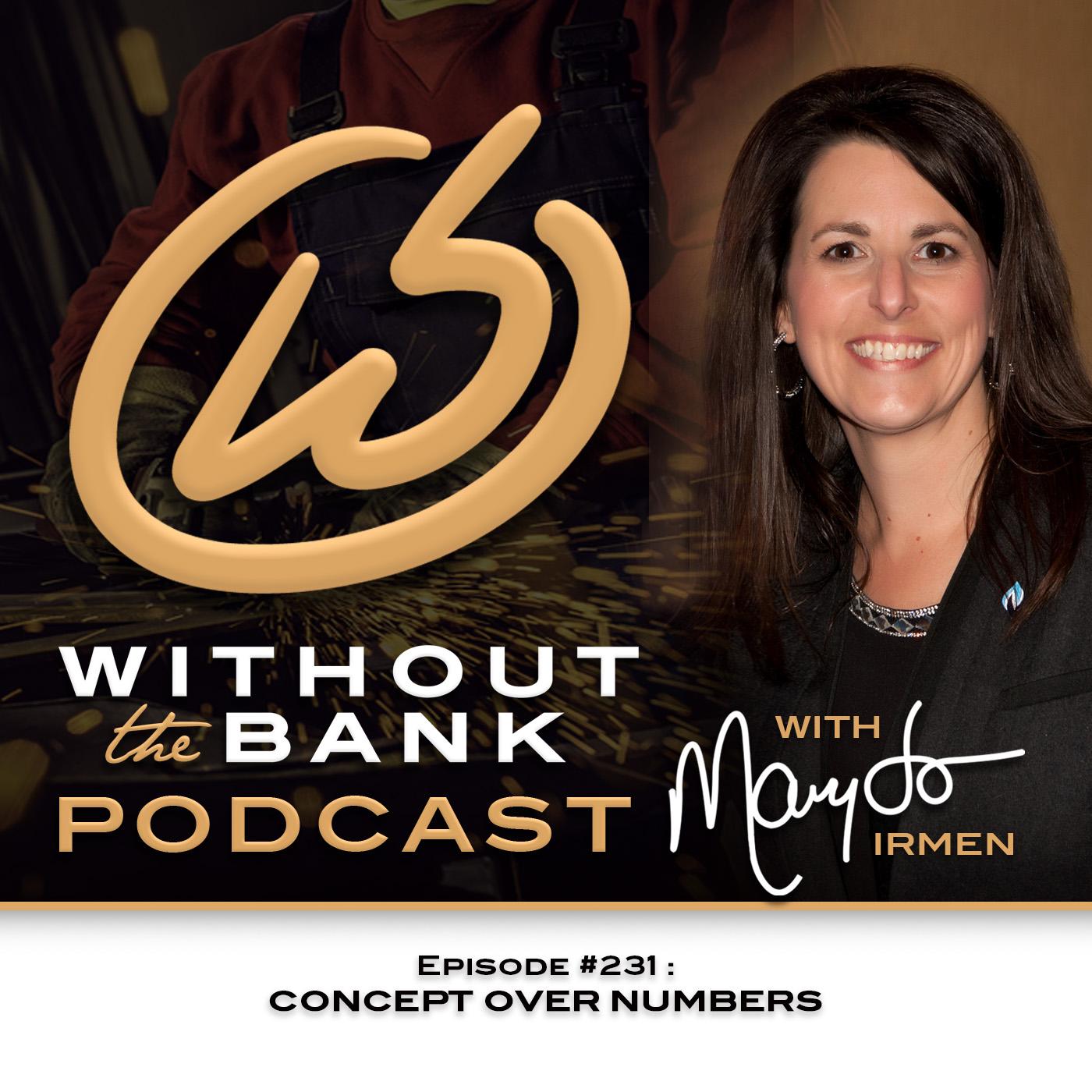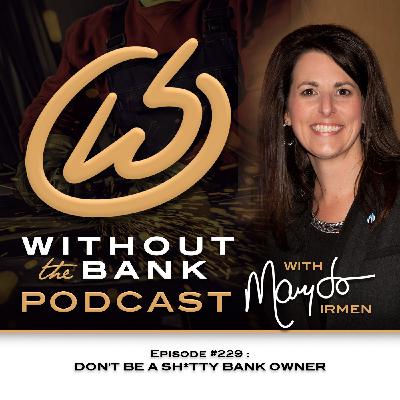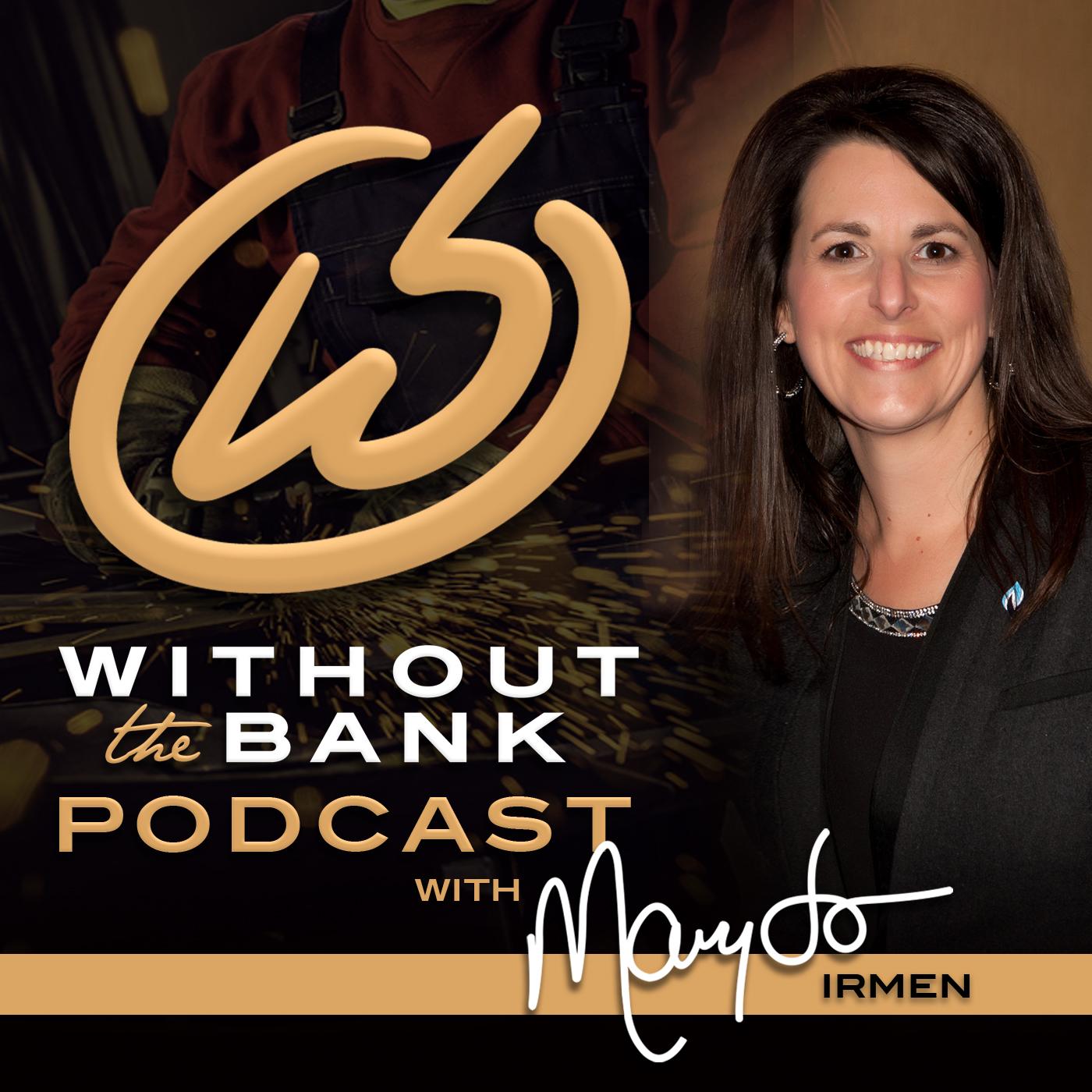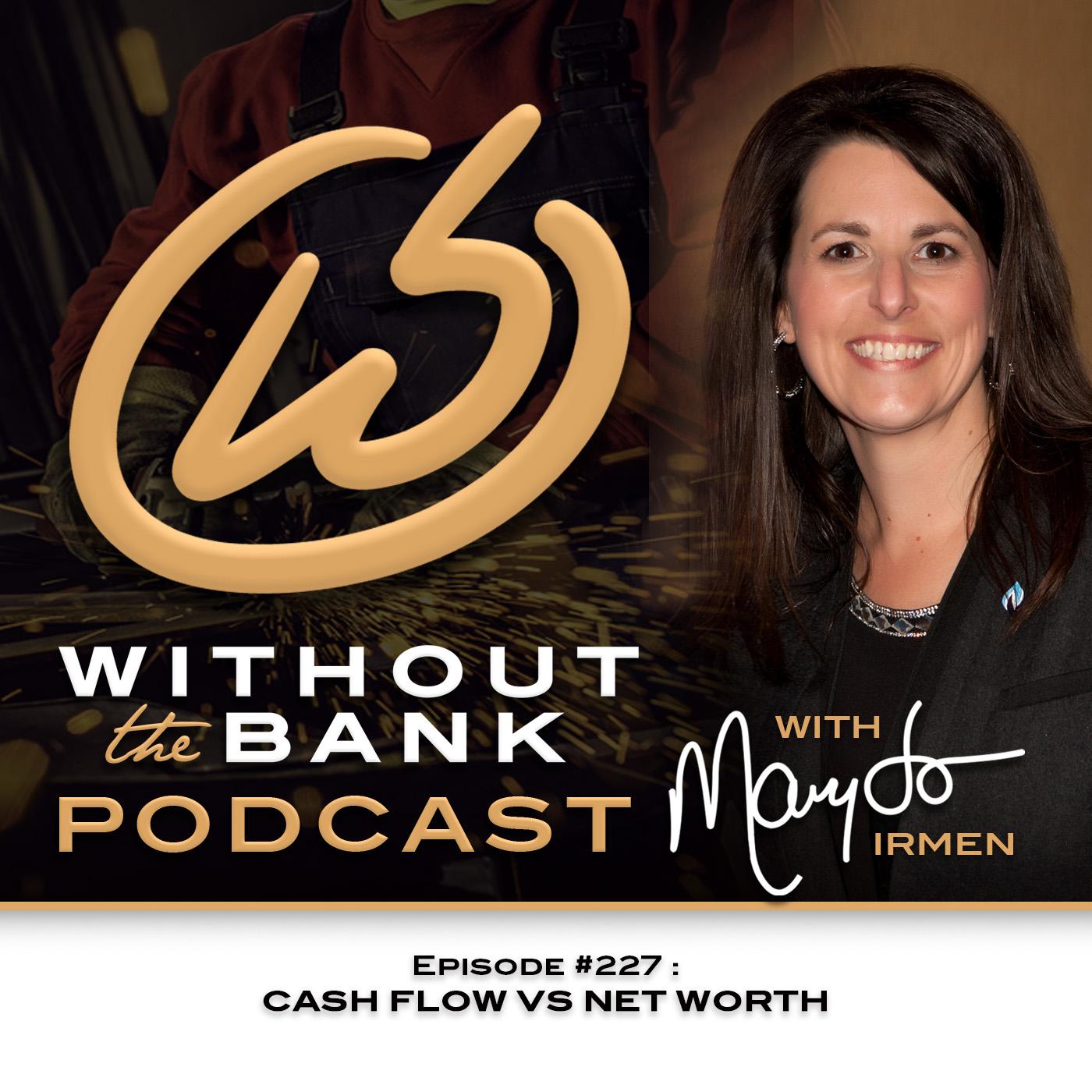Discover Without the Bank Podcast
Without the Bank Podcast

Without the Bank Podcast
Author: Mary Jo Irmen
Subscribed: 55Played: 3,503Subscribe
Share
Description
The archaic system of giving up money today, taking on risk, and hoping to retire is B.S.
This podcast seeks to help make you responsible for your money and your future. You are the one who cares more about it than anyone else. I am here to help you and provide the honesty you need. No sugar coating. No false claims. Just straight up truth.
This podcast seeks to help make you responsible for your money and your future. You are the one who cares more about it than anyone else. I am here to help you and provide the honesty you need. No sugar coating. No false claims. Just straight up truth.
243 Episodes
Reverse
Are you still paying cash for big expenses like college tuition, remodels, or vehicles? You might be losing hundreds of thousands — even millions — without realizing it. Learn how to use the Infinite Banking Concept to make your money work for you every time you spend it. 👉 Follow Mary Jo Here: https://www.youtube.com/channel/UCXYvzroUouEMsTGKFw5nJHQ 👉 Get the book: https://www.withoutthebank.com/book/ In this episode, Mary Jo shares a real-life client story that reveals how even high-income earners, employees, not just business owners, can benefit from Infinite Banking. You'll learn how to recycle the same $30,000 for college costs, turn expenses like remodels and pools into wealth-building opportunities, and why paying cash may be destroying your retirement without you noticing. 🔑 Key Takeaways: ◦ You don't need a business or a farm to use Infinite Banking. ◦ Paying cash for college can secretly cost you millions in lost opportunity. ◦ How to recycle cash value for recurring expenses. ◦ Why borrowing from your policy beats using bank loans or savings. ◦ How to set up policies tied to each child's education for accountability. ⏱️ Chapters: 00:00 – Why Infinite Banking isn't just for business owners 02:30 – The client's story: paying cash for everything 04:45 – The college tuition trap explained 07:00 – Recycling money through policy loans 09:30 – The $1.2M lesson: lost opportunity cost 12:00 – Setting up policies for your kids 14:30 – Why your advisor's approach might be wrong 17:00 – Which book is right for you: Life Without the Bank vs. Farming Without the Bank Grab your copy of "Life Without the Bank" 👉 https://www.withoutthebank.com/book ⭐ Read The Book? Book your 1-on-1 strategy session: maryjo@withoutthebank.com Start building a system that pays you back every time you spend. Links Mentioned 📗 Life Without the Bank: https://www.withoutthebank.com 📘 Farming Without the Bank: https://www.farmingwithoutthebank.com
Kyle Busch just sued Pacific Life Insurance for $8.58 million, claiming he was misled by an Indexed Universal Life (IUL) policy. But what if this high-profile case proves everything Infinite Banking practitioners have warned about for years? 👉 Follow Mary Jo Here: https://www.youtube.com/channel/UCXYvzroUouEMsTGKFw5nJHQ 👉 Get the book: https://www.withoutthebank.com/book/ In this episode of Without the Bank, Mary Jo breaks down the Kyle Busch life insurance lawsuit, exposing how IULs are often mis-sold and why dividend-paying whole life insurance is still the gold standard for Infinite Banking. She dives into: ◦ Why IULs, VULs, and ULs collapse faster than you think ◦ The truth behind "guaranteed" returns and hidden policy fees ◦ What Nelson Nash really meant by "dividend-paying whole life" ◦ How to read your own in-force illustration and spot red flags If you own an Indexed Universal Life policy, or are thinking of buying one, this episode could save you thousands. Key Takeaways ◦ Kyle Busch's lawsuit highlights systemic problems in how IULs are sold. ◦ Whole life and IUL are not the same thing. ◦ Infinite Banking only works with dividend-paying whole life, not market-tied policies. ◦ Always request an in-force illustration at 4% to test your policy's strength. ◦ Education beats marketing. Understand what you're buying before you sign. Chapters: 00:00 – The Problem with Bad Insurance Sales 01:21 – Kyle Busch's $8.5M IUL Lawsuit Explained 03:34 – IUL vs Whole Life: What Agents Don't Tell You 06:03 – Hidden Fees, Failing Policies, and False Promises 08:26 – Why This Case Proves Infinite Banking Works 12:19 – The Real Lesson from Becoming Your Own Banker 17:16 – How to Check (and Fix) Your Own Life Insurance 👉 Have an IUL or UL policy? Send your in-force illustration to Mary Jo for a review. Email: maryjo@withoutthebank.com 👉 Subscribe for more episodes breaking down Infinite Banking truths and exposing insurance myths. 👍 Like, comment, and share this video if you believe in consumer protection and financial education! 🔗 Links Mentioned 📘 Books: https://www.withoutthebank.com/book/ 📅 Schedule an appointment: https://www.withoutthebank.com/contact/
Starting an IBC policy when everything feels worst? That's exactly how Nelson Nash discovered Infinite Banking, when bank rates hit 23% and leverage turned on him. Here's what he did, why it worked, and how to avoid the same traps. 👉 Follow Mary Jo Here: https://www.youtube.com/channel/UCXYvzroUouEMsTGKFw5nJHQ 👉 Get the book: https://www.withoutthebank.com/book/ We continue our study of Becoming Your Own Banker and unpack how the Infinite Banking Concept started. Using Nelson's forestry analogy, we break down uninterrupted compounding, the dangers of overleveraging, why policy design matters (don't chase fast cash value if it weakens the system), and the flexibility of policy loans, especially in bad times. We also address the costly mistake of canceling in Year 5, when policies typically begin to truly cash flow. Key Takeaways: ◦ Plant the tree early: Compounding takes time; interrupting it sets you back years. ◦ Uninterrupted over interrupted compounding: Stop resetting the curve. ◦ Leverage cuts both ways: Gurus rarely explain when the lever flips. ◦ Policy loans = control: Flexible amortization; you set the payback schedule. ◦ Rates context: Banks at ~23% (early '80s) vs policy loans at ~5–8% in Nelson's story. ◦ Design matters: Don't chase extreme 10/90 if it risks MEC and weakens the base. ◦ Discipline wins: You're the banker—operate your system soundly. ◦ Don't quit in Year 5: Many cancel right before policies begin to outperform. Chapters 00:00 Start when times aren't perfect (cold open) 00:50 Intro & setup—studying "How IBC Got Started" 01:11 Forestry analogy & (un)interrupted compounding 03:33 What interruption really costs you 04:28 Policy design tradeoffs (10/90, MEC risk, strong base) 05:07 The compounding curve: the most efficient year is the last 06:01 "Leverage your way to wealth"? What gurus don't say 06:57 Nelson's story: 8–9.5% to 23% prime shock ('81–'82) 08:46 Low-rate era behavior: overbuying & false confidence 10:19 Overpaying for homes/vehicles and today's price hangover 12:10 Leverage risk, HELOC callable, and bad timing 12:57 Risk mitigation vs assuming good times continue 13:25 "Find a fool?" Why selling in bad times fails 14:45 4 a.m. prayer & the realization: the money is in your policies 15:10 Policy loans at ~5–8% vs banks at 23%: why control matters 16:57 You set the amortization—flexibility in downturns 18:03 "How big a check?" = How much have you put in (premiums) 18:51 Revising spending: fund policies first, then attack debt 19:54 Start IBC in bad times, so you're skilled in good times 20:53 The Year 5 mistake: canceling right before cash flow 22:09 End of Life benefit = family protection while you bank 22:28 Discipline: be the banker or break your own bank 23:18 Wrap-up & next chapter invite 👍 Like this if you want more real-talk on IBC beyond the hype. 🔔 Subscribe & hit the bell to follow our chapter-by-chapter study. 💬 Questions about policy design, MEC, or using loans? Drop them in the comments. 📚 Studying along? Bring your copy of Becoming Your Own Banker to the next episode. Link Mentioned: Becoming Your Own Banker — R. Nelson Nash https://www.withoutthebank.com/product/becoming-your-own-banker
Feel "broke" even though you've got money in savings and retirement? You might be trapped by compartmentalized thinking, paying 25–30% on credit cards while your "retirement money" sits idle. In this episode, we show you how to see your finances as one pool of money, become your own banker, and pay yourself back, without making money more complicated. 👉 Follow Mary Jo Here: https://www.youtube.com/channel/UCXYvzroUouEMsTGKFw5nJHQ 👉 Get the book: https://www.withoutthebank.com/book/ We break down Nelson Nash's Becoming Your Own Banker and the "97/3" insight: wealth is a skill, not a windfall. You'll see how banking is a process you already participate in, and how to start controlling more of it. From braces and car payments to IRAs and credit cards, we show how small shifts (and an honest repayment plan to yourself) can transform cash flow. Key Takeaways: ◦ Money is one pool, no matter how many accounts you split it into. ◦ Don't earn 5% in an IRA while paying 25–30% on credit cards—that math loses. ◦ Becoming your own banker = borrow from your pool and pay yourself back (with interest). ◦ Wealth is a skill: discipline, tracking, and continuous learning beat lucky breaks. ◦ Control cash flow first; assets and compound growth follow. Chapters 00:00 Why you feel "broke": the compartmentalization trap 01:27 Becoming Your Own Banker (Intro to the first chapter) 01:58 The 97/3 rule: wealth as a skill, not a windfall 03:18 Can't manage $1? You can't manage $1M (cash flow vs income) 04:13 Spending leaks: Starbucks, dining out, and "must be nice" 06:16 Lottery winners & why sudden money rarely lasts 08:14 "You don't have to change anything"… actually, you do (habits) 09:36 Continuous learning vs arrival syndrome 11:11 Banking is the most important business; money must flow 12:31 There's only one pool of money 14:09 Using IRAs vs bank loans: the real cost of capital 15:45 We've been trained to think money is "complicated" 16:06 Retirement balances vs 30% cards: pay yourself back instead 18:27 Braces example: cash discount, banker hat, repayment plan 19:12 It's not complicated—use an amortization schedule 20:23 Control the banking function in your life 21:12 Overwhelm? Start with baby steps + an advisor 22:29 Choose your hard: money stress vs money discipline 23:35 Why money problems strain everything (even marriages) 24:28 Keep learning the language of money 25:14 What's next & how to get the books 👉 If this helped, like & subscribe for more real-talk money strategy. 💬 Drop a comment: What's one bill you could start "paying back to yourself" this month? 📩 Questions? Email us. Mary Jo: maryjo@withoutthebank.com Tarisa: tarisa@withoutthebank.com 🧮 Need a plan? Use the amortization calculator mentioned to set your personal "pay-yourself-back" schedule. 📚 Get the books: Life Without the Bank and Nelson Nash's Becoming Your Own Banker. Links Mentioned: Life Without The Bank and Becoming Your Own Banker 🔗 https://www.withoutthebank.com/book/ Amortization Schedule 🔗 https://www.farmingwithoutthebank.com/amortization-calculator/
What if you could use the same dollar twice, to buy your dream car today and still have it grow for your retirement tomorrow? In this episode, we uncover the 7 Points to Consider from Nelson Nash's legendary book Becoming Your Own Banker and why understanding where your money lives could change your financial future forever. 👉 Follow Mary Jo Here: https://www.youtube.com/channel/UCXYvzroUouEMsTGKFw5nJHQ 👉 Get the book: https://www.withoutthebank.com/book/ In this episode #239 of the Without The Bank Podcast, we dive deep into how to make your money work harder through the Infinite Banking Concept (IBC). Mary Jo and Tarisa explore why traditional retirement plans like 401(k)s and IRAs limit your control, how to leverage life insurance cash value for financing major purchases, and what it really means to have your money at work. They challenge common beliefs about debt, discuss the dangers of government-controlled retirement systems, and show real-life examples of how cash value policies grow wealth over time. Whether you're new to Infinite Banking or already building your own private banking system, this episode gives you practical wisdom straight from Nelson Nash's timeless principles. 💡 Key Takeaways: ◦ There are only two sources of income: people at work and money at work. ◦ You can use the same money multiple times through proper leverage. ◦ The government controls 401(k)s and IRAs more than you realize — and profits from it. ◦ Wealth must reside somewhere — make sure it's under your control. ◦ You finance everything you buy, whether you realize it or not. ◦ Compound interest is powerful when it's uninterrupted. ◦ Start small — even a $5,000 policy can grow into hundreds of thousands in value. ⏱️ Chapters: 00:00 – Using the same money twice 01:22 – Fun studio intro & casual chat 02:10 – Point #1: People at work vs. money at work 04:16 – Point #2: Passive income and long-term thinking 05:06 – Point #3: Stop giving your money to someone else's bank 07:01 – Point #4: Government manipulation & retirement plan control 13:02 – Point #5: Where does your wealth reside? 16:59 – Point #6: You finance everything you buy 22:02 – Point #7: Your need for financing exceeds your need for insurance 23:44 – Real policy example & long-term results 25:44 – Final thoughts & call to action If you're ready to learn how to take control of your money, start your own banking system, and grow wealth the smart way: ⓵ Subscribe now ⓶ Leave a comment with your biggest takeaway ⓷ Share this episode with a friend who needs financial freedom! 📚 Resources Mentioned: Becoming Your Own Banker by R. Nelson Nash 🔗 https://www.withoutthebank.com/book/ Warehouse of Wealth by Nelson Nash 🔗 https://www.withoutthebank.com/produc... Economics in One Lesson by Henry Hazlitt 🔗 https://www.amazon.com/Economics-One-...
Most people obsess over "rate of return", but they miss the banking process that controls every dollar in their life and how to leverage that same dollar to make more. Book: Life Without The Bank by Mary Jo Irmen 📌 https://www.withoutthebank.com/book/ In this episode, we unpack the Introduction & Points to Consider from Nelson Nash's Becoming Your Own Banker and show how dividend-paying whole life can be an AND asset: fund your policy and still deploy capital into investments. Mary Jo and Tarisa break down why Infinite Banking (IBC) is education, not a sales tool, why your need for financing is greater than your need for protection, and how the end-of-life benefit, privacy, control, and long-range planning all fit together. We clarify common myths (like "recapturing interest"), compare AND vs OR assets, discuss HELOC call risk, and explain why IBC is about where wealth resides, not chasing returns. Key Takeaways: ◦ IBC is a financing process, not an investment. Use whole life to control capital flows, then invest. ◦ Your need for financing outweighs your need for protection. Solve financing correctly, and you end up with a bigger financial legacy for your loved ones. ◦ It's an AND asset. Fund the policy, borrow, and still invest (real estate, brokerage, IRA contributions, etc.). ◦ Clarifying "recapture interest." You're redirecting the spread by paying yourself more than the policy loan rate, which requires discipline. ◦ Major items only. Think of cars, equipment, appliances, education, business capital expenditures, not coffee and fries. ◦ Control & privacy matter. Policy loans aren't reported to bureaus; contracts are private. ◦ HELOCs can be called. Don't build your "bank" on someone else's terms. ◦ Long-range planning wins. Power compounds in later years; this is a get-rich-slow, multi-generational approach. 🔗 Links Mentioned Book: Becoming Your Own Banker (5th Edition) by R. Nelson Nash 📌 https://www.withoutthebank.com/product/becoming-your-own-banker/ Book: Life Without The Bank by Mary Jo Irmen 📌 https://www.withoutthebank.com/book/
"You don't make money by taking loans, you make money by paying premiums." In this candid episode, we unpack the biggest lessons from our Infinite Banking (IBC) journey; what we got right, what we'd do differently, and the costly myths we had to unlearn. From early nerves (Is this even legal?) to 15 years of using dividend-paying whole life policies, we share our most honest takeaways: how to think about premiums vs. loans, why the right mentor matters, using policies as a throughput system (not a piggy bank), the danger of "extra interest" hype, tracking growth, and building community so you're not learning IBC alone. Plus: a quick warm-up on guinea pigs in Switzerland 🐹 and the tipping culture rant you didn't know you needed. Key Takeaways: ◦ Legality check: Policy loans are legit (state insurance departments literally describe them). ◦ Core truth: You don't "profit" from taking loans; you build wealth by funding premiums and letting cash value compound. ◦ Throughput mindset: Run money through your policy, then deploy it—don't starve premiums to pay expenses. ◦ "Extra interest" clarity: Paying extra only helps when it's added as an additional premium (not just loan interest). ◦ Mentorship matters: A good advisor prevents expensive missteps and helps sequence debt, premium, and cash flow. ◦ Start smart: Begin conservatively; learn by doing (without gimmicks like funding with 0% cards—don't). ◦ Track & compare: Log monthly growth and save your original illustration to compare real vs. projected. ◦ Community wins: Surround yourself with active policy users (Think Tank vibes, client meetups, Q&As). Chapters: 00:00 I wouldn't change it: timing, trust, and going all-in 00:21 How we dove in: think tanks, reading, sleepless curiosity 00:53 Welcome back + today's topic setup 01:18 Fun fact: Switzerland bans owning a single guinea pig 🐹 02:14 Rant time: tipping culture, service, and expectations 05:12 "Harmony" the waitress & tipping for great service 10:06 Coffee costs, tipping prompts, and value 11:04 Topic begins: Lessons learned on the IBC journey 11:37 Looking back with experience vs. starting out 11:58 Were we nervous? (Stock market vs. IBC peace of mind) 12:25 "Is this legal?" and how we verified it 13:31 Guarantees & risk-averse comfort with IBC 15:13 Skepticism after a bad experience; finding IBC 15:37 What we'd tell our younger selves (client & agent) 15:58 Premium vs. cash value—using policy as a pass-through 17:04 Premium is an "environment" for money to flow through 18:07 Advisor sequencing: debt, cash flow, and policy loans 19:14 Agent lessons: mentorship, brand, and language 20:00 Big myth: you don't make money on the loan 21:01 Why cash value still grows when you borrow 21:52 Nelson's "extra interest" = more premium (not loan profit) 22:51 Simplifying repayment (and avoiding hype) 23:57 "Just start"—conservative, consistent funding 24:15 A cautionary start (0% card) and why not to do that 26:04 Why guidance matters (your life dictates the sequence) 28:04 Surround yourself with IBC users & Think Tank energy 29:30 Community: Coffee with MJ, client summits 30:44 Track monthly growth; watch it season over time 31:11 2010 policy: 15-year reflection 31:34 Keep your original illustration—compare later 32:30 No regrets; right timing vs hindsight 33:17 Going full force: learning, events, immersion 34:00 Think Tank excitement & new-agent energy 34:45 Client events cadence & getting people to show up 😄 35:31 How to connect + next steps 👉 Get the book, learn the fundamentals, and avoid the common pitfalls. https://www.withoutthebank.com/book/ 👉 Read the book and ready to design your first (or next) policy? Schedule an appointment with Tarisa or Mary Jo. 👉 Clients: join Coffee with MJ and keep compounding your knowledge. Links & Contacts Mentioned: Book & resources: https://www.WithoutTheBank.com/ Emails: Tarisa@WithoutTheBank.com | MaryJo@WithoutTheBank.com (Clients) For Coffee with MJ & summit details: check your client portal/email invites #InfiniteBanking #IBC #BecomingYourOwnBanker #WholeLifeInsurance #NelsonNash #CashValue #PolicyLoans #PersonalFinance #FinancialEducation #Compounding #DebtStrategy
Mary Jo and Tarissa challenge common financial advice about compounding interest. A billionaire may have praised the "power of compounding," but Mary Jo explains what he left out: interruptions. Using relatable examples from bodybuilding, business, and everyday life, she shows why uninterrupted compounding is what truly builds lasting financial security. Audio Production by Podsworth Media - https://podsworth.com
In this episode, Mary Jo delves into the cost-efficiency of life insurance, explaining why it's more beneficial to write smaller premium checks in exchange for larger death benefits. She highlights the reliability of life insurance companies paying out claims with historical examples, and also touches on the comparative weakness of term-life compared to whole-life insurance policies. Audio Production by Podsworth Media - https://podsworth.com
Not everyone is ready to start a policy today—and that's okay. In this episode, Mary Jo shares a real story of working with a firefighter/EMT who felt stuck financially. Instead of selling him something he couldn't afford, she helped him map out practical, creative ways to generate cash flow—from teaching first aid to selling emergency kits. This is what working with Without the Bank actually looks like: no pressure, just real strategy. If you've ever felt stuck or unsure how to start, this episode is packed with ideas and honest advice. Audio Production by Podsworth Media - https://podsworth.com
In this episode, Mary Jo and Tarisa dive into the importance of using money to create cash flow, and not merely saving it. They discuss Nelson's journey of overcoming significant debt and beating Parkinson's law, the importance of shifting from a scarcity mindset to an abundance mindset, and the various ways to use your policy for financial growth. They also share some fun stories! Audio Production by Podsworth Media - https://podsworth.com
In this episode, Mary Jo and Tarisa dive into the realities of being a life insurance agent, addressing the industry's complexities and the challenges that new agents face. They discuss the importance of understanding the power dynamics with General Agents (GAs), the potential pitfalls of joining the wrong agency, and how crucial it is to align with a supportive GA. Through personal anecdotes and expert advice, they cover what new agents can expect, the industry's 'smoke and mirrors', and the resilience needed to succeed. Audio Production by Podsworth Media - https://podsworth.com
In this episode, Mary Jo and Tarisa tackle a common question about financial strategies: whether to 'buy term and invest the difference' - or to choose a dividend paying whole life policy, and to implement the Infinite Banking Concept. Join in as they have a detailed discussion on the drawbacks of term insurance and the benefits of whole life, especially when considering long-term liquidity, control, and guarantees. They highlight the holistic approach needed to manage finances effectively involving due diligence, reading the foundational IBC texts, and consulting with a certified IBC practitioner. Audio Production by Podsworth Media - https://podsworth.com
Some of the worst advice we ever get is to avoid taxes. In this episode, I run through some numbers of why it truly does not make sense to buy things to avoid taxes; we just transfer money to the bank instead of keeping it, or we give up liquid cash. (Updated version of Ep. 37; originally published November 19, 2021.) Audio Production by Podsworth Media - https://podsworth.com
In this episode, Mary Jo discusses common issues faced by clients, such as unnecessarily canceling policies or being misled by other agents into switching policies. She stresses the necessity for continuing education regarding how to use your policies so that you can be a good banker. Audio Production by Podsworth Media - https://podsworth.com
In this episode, Mary Jo we delves into the complexities and risks associated with universal life insurance policies, using a real-life client scenario to illustrate the issues. This example serves as a cautionary tale about the true cost of these policies, especially for older policyholders, and offers guidance on making informed decisions to potentially avoid substantial losses. Audio Production by Podsworth Media - https://podsworth.com
Mary Jo explains why chasing net worth won't move you forward and why cash flow is what truly matters. She shows how using your money with purpose can open the door to real freedom and momentum. Audio Production by Podsworth Media - https://podsworth.com
Scarcity thinking might feel safe, but it's quietly sabotaging your financial future. In this episode, Mary Jo unpacks how emotional baggage, financial PTSD, and debt-free obsession can block real wealth-building and keep you stuck playing small. Audio Production by Podsworth Media - https://podsworth.com
In today's episode, Mary Jo calls out the chaos in blue-collar businesses and makes a clear case for hiring help. If you're in the trades and tired of missed calls, poor communication, and 70-hour work weeks, this one's for you. Audio Production by Podsworth Media - https://podsworth.com
What happens if your partner or key employee dies? Mary Jo shares why buy-sell and key man policies are a must to protect your business. Audio Production by Podsworth Media - https://podsworth.com


